AWARENESS, PERCEPTION AND ATTITUDE OF MAJOR TRIBES IN NIGERIA TOWARDS COVID-19: A CROSS SECTIONAL STUDY OF SELECTED COMMUNITIES
AWARENESS, PERCEPTION AND ATTITUDE OF MAJOR TRIBES IN NIGERIA TOWARDS COVID-19: A CROSS SECTIONAL STUDY OF SELECTED COMMUNITIES
Author(s): Olumide Abraham Ajayi, Mary Oluwayemisi Akosile, Grace Olabisi Ajayi-OluajayiSubject(s): Government/Political systems, Health and medicine and law, Present Times (2010 - today)
Published by: Ediktura Beladi
Keywords: awareness; perception; attitude; Covid-19; preventive health;
Summary/Abstract: This study examines awareness, perception and attitude of major tribes in Nigeria towards covid-19. The objective of the study is to examine the level of awareness, perception and attitude of major tribes in Nigeria towards corona virus. The study seeks to answer three major questions in relation to covid-19 among the major tribes in Nigeria: (1) what is the level of awareness of major tribes in Nigeria about Corona virus? (2) what is the perception of individuals from major tribes in Nigeria about corona virus? (3) what is the attitude of individuals from major tribes in Nigeria towards prevention of Corona virus? The scope of the study covers four towns in Lagos and Ogun states where individuals who belong to the three major tribes in Nigeria reside. Descriptive research design was adopted for this study. The population consists of Hausa, Igbo and Yoruba tribes. Purposive and systematic random sampling technique was used to draw sample elements. Data generated were analyzed using frequency distribution and percentages. The findings show that people are aware of myriads of information about corona virus. However, only 36.6% of respondents perceived that the virus is real. 81.3% of respondents observed that businesses are running at a loss. The study shows that people did not exhibit good attitude towards preventive health as only 36.4% of respondents are willing to be tested voluntarily for corona virus. The study therefore recommends the need to create more awareness and place emphasis on the need for preventive health.
Journal: Revista Universitară de Sociologie
- Issue Year: XVI/2020
- Issue No: 2
- Page Range: 26-33
- Page Count: 8
- Language: English

